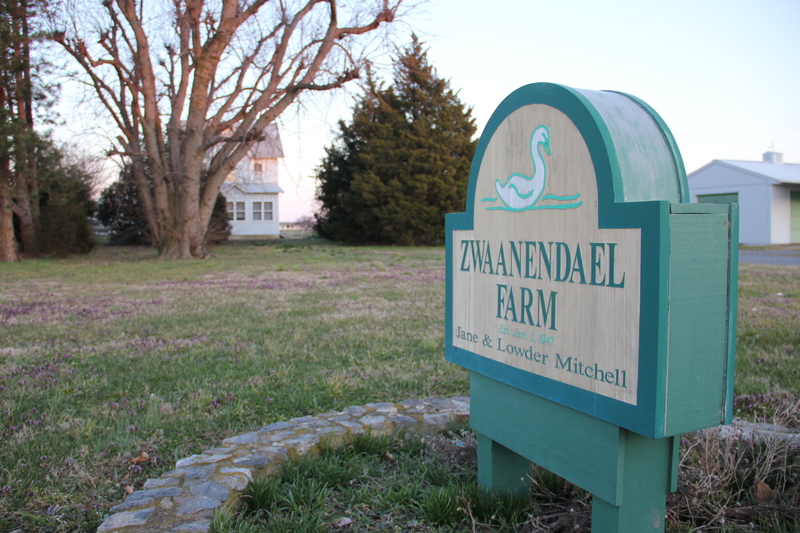It’s the first question Realtor Paul Townsend gets when people find out he’s listed the Zwaanendael Farm at the edge of Lewes for sale: “Isn’t that farm in Delaware’s Farmland Preservation program?”
The answer is yes, it is in farmland preservation. “But only until April 22 of this year,” said Townsend. “It’s been in the 10-year program, maybe more than once, but it’s running out.”
How can that happen? Isn’t preservation preservation? Not exactly. In Delaware, there are two tiers of preservation. The Delaware Department of Agriculture website explains the preservation process: “Landowners who place their lands into Agricultural Preservation Districts agree to not develop their lands for at least 10 years, devoting the land only to agriculture and related uses. In return, the owners receive tax benefits, right-to-farm protection, and an opportunity to sell a preservation easement to the state that keeps the land free from development permanently.”
Lowder and Jane Mitchell raised their family on the farm. They grew grain crops which they sold for feed and for many years raised garden vegetables they sold from a roadside stand. In 1999 their farm was recognized as one of Delaware’s Century Farms, meaning it had been in the ownership of the same family for more than 100 years.
Active in the Grange and Delaware’s Farm Bureau, Jane Mitchell was instrumental in setting up the farmland preservation program. She and Lowder believed in it and registered their farm with the program, but they never took the final step of permanently selling their development rights to the state.
After a long life of farming and civil service with Delaware, Lowder died last summer at the age of 84. As is often the case with devoted couples who have spent a lifetime side by side, Jane died barely six months later, at 83.
A couple of years before their deaths, Jane and Lowder met with Rob Gibbs and me on behalf of the Greater Lewes Foundation. We were exploring the possibility of buying a conservation easement to ensure that Zwaanendael Farm would remain in agriculture. It was a long shot, but we thought it was worth an effort.
The Mitchells listened intently and politely but ultimately made it clear that they didn’t want to take away any future options from their sons and grandson who would inherit the farm. Obviously they felt the same about permanent preservation under Delaware’s program.
Program gave them peace
“I think they, like other farmers I know, did it as much to keep people from hounding them about buying the farm as they did for the tax benefits,” said Townsend. Now that Jane and Lowder have passed, their heirs are allowing the farm’s inclusion in the 10-year program to expire and have opted to sell.
Working out of the Jack Lingo Realtor office in Lewes, Townsend knows the farm intimately. For many years he watched Lowder turn the ground with a plow, following with a disc to break the clods and smooth the field, finishing with the planter pushing corn and soybean seed into the fertile earth.
On many occasions, Lowder told me the 60 or so acres - flat, excellent soil and well drained - was as fine a piece of farmland as there was east of the Mississippi.
“That farm has made money for me every year, without irrigation,” he often said.
Now the farm is up for sale for $520,000 per acre. That comes to a total price of about $30 million, give or take a few hundred thousand dollars based on whatever a survey reveals is the exact acreage of the farm. “The owners are willing to subdivide, so this could stretch out for several years,” said Townsend. He said the per-acre price is based on an offer of a half million per acre the Mitchells received some years ago for some of the acreage, when the farm was deeper in the ag preservation program.
With its agricultural/residential zoning, the property can be subdivided into a minimum of about 96 lots. Townsend said the Lingo Townsend Partnership he is part of, which owns and is developing hundreds of acres of land around Lewes, is “absolutely not a potential buyer” at this point. “We are doing the best job we can for our clients and want no conflict of interest whatsoever.”
Townsend said the property includes the Mitchells’ farmhouse, which dates back to about 1895, and another adjacent house which is a rental property. He doesn’t expect a quick settlement, so he says the preservation clause in place until April 22 shouldn’t be a problem.
In the meantime, Townsend said, Brad Ritter is farming the land for the family. “I hope to see some lima beans in the rotation there at some point.” His business partnership also includes the J.G. Townsend vegetable-packing operation in Georgetown, which contracts with Sussex farmers to grow a number of food crops, including limas. He knows that the land, until it is ultimately sold, most likely for development, will keep on producing as it did for so many decades under Jane’s and Lowder’s watch.











































